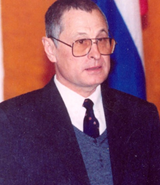Aleksandr Mikhaylovich Butenko
 Aleksandr Mikhaylovich Butenko, Head of the Arboviruses Department and the Laboratory of Arbovirus Biology and indication, recipient of the National Award of the Russian Federation in Science and Technology and D.I. Ivanovsky Award in Virology.
Aleksandr Mikhaylovich Butenko, Head of the Arboviruses Department and the Laboratory of Arbovirus Biology and indication, recipient of the National Award of the Russian Federation in Science and Technology and D.I. Ivanovsky Award in Virology.
In 1962, after graduation from the Biology and Soil Department of M.V. Lomonosov Moscow State University, he was hired by the Laboratory of Hemorrhagic Fevers of the Institute of Poliomyelitis and Viral Encephalitides of the Academy of Medical Sciences of the USSR headed by academician M.P. Chumakov.
In 1966, he defended his candidate thesis on the topic of Isolation of the Western Nile Fever Virus from Hyalomma Plumbeum Ticks and Studying its Properties, in 1971 – his doctoral thesis on the topic of the Materials for Studying Etiology, Laboratory Diagnostics, and Immunology of Crimean-Congo Hemorrhagic Fever: Agent Virus Ecology Issues (1971). He was the leader and an immediate participant of a number of science topics and expeditions for studying epidemic nephritis and tick-borne encephalitis in Bashkortostan, Khabarovsk Territory, and Latvia. He was directed to Nigeria (1973) and Uganda (1974–1975) as a WHO consultant. He was the director of the Virologic and Microbiological Laboratory of the Ministry of Healthcare of the USSR in the Republic of Guinea (1982–1984).
He has been working in D.I. Ivanovsky Institute of Virology (a part of N.F. Gamaleya Research Center of Epidemiology and Microbiology since 2014 of the Ministry of Healthcare of the Russian Federation) since 1986.
Aleksandr Butenko have made a major contribution to solving the problem of Crimean-Congo hemorrhagic fever: isolation of the virus, studying its properties, proving the nosological unity of the fever in various parts of its areal, development of a specific diagnostics system, creation of the vaccine, comprehensive study of the epidemiological aspects and the factors of natural nidality. He has obtained important data on spreading, classification, pathogenicity for a human being and epidemiological significance of many arboviruses, including the Western Nile, Dhori, Ukuniemi, Sindbis, Bhandzha, Batai, Tyaginya, Inco, Alpine Hare, Barur, Kismayo, Cutango, Kindia, Forecaria, etc. In the course of cooperation with the practical institutions of the healthcare bodies, he exercises control over the epidemiological situation with regard to the endemic infections of this group as well as imported tropical infections using the immunoenzymometric test systems developed by the laboratory and introduced into practice.
In 1999, under his supervision and with his immediate involvement the etiology of the Western Nile fever was identified and many aspects of epidemiology of the major outbreak of Western Nile fever in the south of the European part of Russia were studied.
He is an author of 360 published research works, including sections in monographs and 9 methodological guidance papers, an advisor for two doctoral theses and a supervisor for 17 candidate theses. Chairperson of the Arboviruses and Other Zoonosis Viruses task team, member of Hemorrhagic Fevers and Tick-Borne Encephalitis task teams, member of the editorial staff of the Epidemiology and Infectious Diseases journal, the Medical Parasitology and Parasitic Diseases journal, member of specialized scientific councils for defense of theses of D.I. Ivanovsky Institute of Virology (division of N.F. Gamaleya National Research Center of Epidemiology and Microbiology of the Ministry of Healthcare of Russia) and M.P. Chumakov institute of Poliomyelitis and Viral Encephalitides. For several years, he had been giving lecturers on arbovirus infections and hemorrhagic fevers at the Chair of Virology of the Medical Prophylaxis Department of Post-graduate Education I of I.M. Sechenov Moscow Medical Academy.
In 2018, by an order of the President of the Russian Federation, Aleksandr Butenko was assigned the Honored Scientist of the Russian Federation honorary title for his merits in the field of healthcare, development of the medical science, and many years of commitment.
